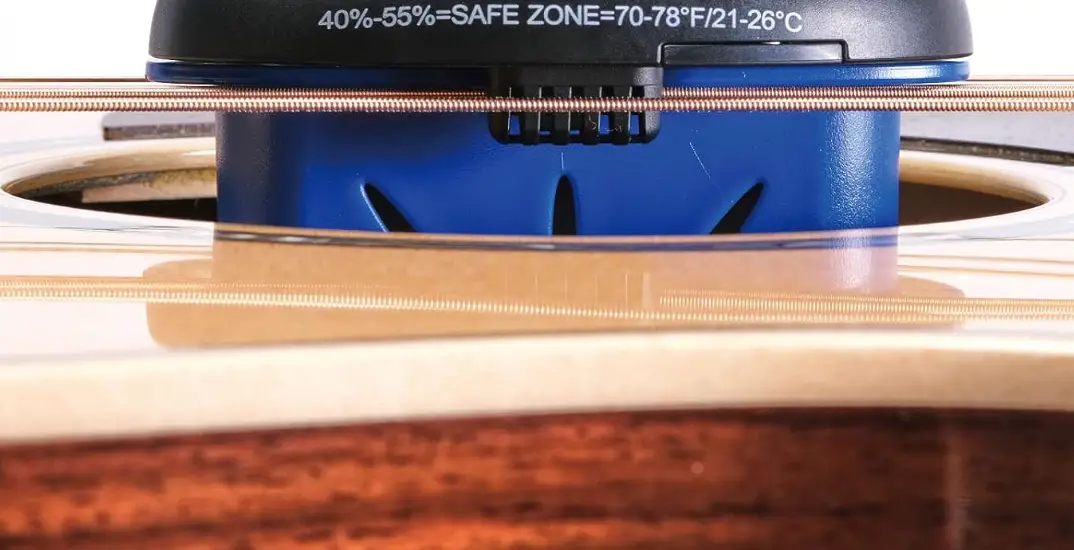When it comes to preserving the quality and longevity of your guitar, comprehending why guitar humidifiers are indispensable is crucial. Many musicians, especially beginners, tend to neglect this vital aspect of guitar care, resulting in expensive repairs, poor sound quality, or in extreme cases, a ruined instrument.

Understanding the Need for Humidity Control
Why guitar humidifiers are important begins with understanding the relationship between wood and humidity. Wood is a hygroscopic material. In simpler terms, wood absorbs and releases moisture depending on the humidity levels in the surrounding environment.
When wood absorbs moisture, it expands. Conversely, when it releases moisture, it contracts. Because your guitar is primarily made of wood, it’s susceptible to these changes. In regions or seasons of low humidity, the wood can dry out, potentially causing cracks or warping.
High humidity poses risks too; excessive moisture can lead to swelling and other forms of water damage. Both extremes are harmful and can result in costly repairs or even render your guitar unplayable.
Why Guitar Humidifiers Are Not Optional
Given the sensitive nature of wooden instruments, guitar humidifiers aren’t just an accessory; they are a necessity. If you are serious about keeping your guitar in top condition, then it’s imperative to control its exposure to humidity.
Skipping on a humidifier might save you some money upfront, but the long-term costs could be significantly higher, involving professional repairs or even a full replacement of your instrument.
Proper humidity levels not only protect the physical structure of your guitar but also maintain its sound quality. Warped or cracked wood can severely impact resonance and pitch, undermining your guitar’s performance.
Read more guitar topics here – Guitar Questions: Get the Right Answers to Your Burning Questions
Types of Guitar Humidifiers
You’ll find various types of guitar humidifiers available in the market, each with its own set of pros and cons. Here’s a quick breakdown:
Soundhole Humidifiers: These fit directly into your guitar’s soundhole. They are convenient but should be monitored to ensure they don’t drip water into your instrument.
Case Humidifiers: These are designed to be placed in the guitar case. They are effective for maintaining consistent humidity but require a good-quality case for best results.
Room Humidifiers: These regulate the humidity of the entire room where you store your guitar. They are the most comprehensive solution but can be more expensive and require more space.
Which type you choose will depend on your specific needs, where you store your guitar, and your budget. Read customer reviews and consult professional advice to make an informed choice.
How to Use a Guitar Humidifier Effectively
Installing and maintaining a guitar humidifier is straightforward, but it does require consistent monitoring. First, read the manufacturer’s instructions for the specific humidifier you’ve chosen. Generally, you’ll either place it in the guitar case or directly in the soundhole.
Room humidifiers require an electrical outlet and will sit on the floor or a table. Once installed, check the humidity levels regularly with a hygrometer, an instrument that measures air moisture. The ideal humidity level for most guitars is between 45% and 55%.
Make it a weekly task to check these levels. If your humidifier needs refilling or replacement, do so as soon as possible to maintain an optimal environment for your guitar.
Why Guitar Humidifiers Are Essential: Final Thoughts
If you’re still on the fence about why guitar humidifiers are essential, consider it a small investment for your guitar’s health and longevity. The cost of a humidifier is minuscule compared to potential repair bills or, worse yet, the purchase of a new guitar. Understanding why guitar humidifiers are so important is the first proactive step you can take toward becoming a responsible guitar owner.
